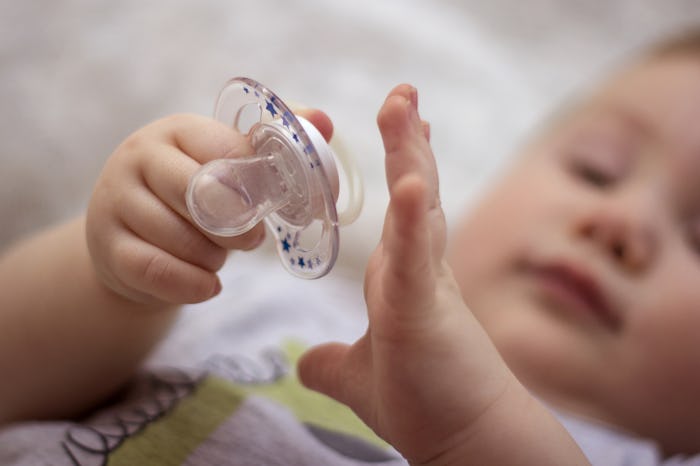Life

Wondering When To Toss The Pacifier? Here Are 5 Signs It's Officially Time
For such a small piece of plastic, a pacifier sure can stir up a lot of controversy. Parents wonder about a binky's effect on their children's teeth, emotional development, and speech — not to mention the judgment of other parents. As Junior toddles around the grocery store with binky in hand, many ask, how old is too old for plastic pacification? Romper reached out to a dentist and a pediatrician to identify these five signs it's time to give up the pacifier, challenging as it may be.
But before I get to the signs your baby or child is ready for this change, know that doctors don't see much in the way of benefits from pacifiers after the 6-month mark. According to Parenting, between 6 to 9 months is the best time to wean your child off their pacifier. It might sound strict — I mean, what parent doesn't wish they had a binky to pass back on a long car ride? — but it makes a lot of sense.
As Rebecca Dixon, MD, of Riley Hospital for Children and Indiana University Health explains in an interview with Romper, there's a "window of opportunity" when it comes to pacifiers. First, you'll want to wait to start using one until breastfeeding has been established, says Dixon, which can take from four to six weeks. After that, a pacifier might even protect your baby to some extent: studies show they're protective against Sudden Infant Death Syndrome (SIDS). However, after the 6-month mark, your child's risk of SIDS falls dramatically — and so do the benefits of pacifier use.
"The protective measures aren’t there, and the longer you wait to get rid of the pacifier, the harder it is," says Dixon.
Truer words were never spoken.
1Your Baby's Over 6 Months Old
After just 6 months of life, your baby isn't benefiting hugely from her pacifier habit. And unfortunately, there's even some evidence that prolonged pacifier use does harm.
For instance, as teeth start coming in, they're actually forced to grow around the pacifier, says Dr. Chris Kammer, DDS, the Founding Father of the American Academy for Oral Systemic Health, in an email interview with Romper. Kammer suggests that parents replace the pacifier with a more flexible Spry Kid's Banana Brush, which gives them something to chomp that doesn't impact their dentition.
One thing you definitely should not do: replace that pacifier with a bottle full of milk or juice at nighttime. Because liquids pooling in the mouth are a breeding ground for bacteria, the effects on dental health can be "devastating," says Kammer.
2Your Toddler Is Using It Every Day, All Day
Look, if you didn't get rid of the binky when your baby was 6 months and 1 day old, it's OK. You're human — and a parent. But if your toddler is using a pacifier all day long, it's probably time to phase it out. According to Dixon, a pacifier can interfere with how the palate is formed, and that can in turn impact speech development.
"Constant pressure against the palate, especially that hard part up towards where the teeth are, that can really effect that formation of those bones and the soft tissues there," she explains.
Unfortunately, it's impossible to tell in advance if a pacifier is having an adverse effect on speech. As Dixon explains, a 2-year-old only speaks about 200 words, and just fifty of those are intelligible, so "you can't really go based on that," she says.
For that reason, dropping the pacifier earlier rather than later makes sense. And as Dixon rightly points out, it's easier to argue with a 6-month-old than an 18-month-old.
3You've Found The Perfect Transitional Object
As any parent knows, kids turn to their pacifiers for emotional reassurance and much-needed comfort. So before you take the binky away, make sure you have a solid replacement ready.
"If you can find a transitional object that you can replace the pacifier with, you’re probably going to be better off," says Dixon, noting that objects with ribbons are very soothing to the touch.
4You're At A (Relatively) Calm Place In Your Life
After a death in the family, during an illness, or right before a move — all of these are terrible times to take a comforting habit away. If you're going through a life-changing or traumatic event, Dixon recommends waiting to wean. In the long run, a few weeks won't make much difference.
When you are ready to make the switch, she recommends phasing the pacifier out during the day. Until your child becomes accustomed to finding comfort in her transitional object, she can still hang on to it at night.
5Your Child Is Venturing Out Into The World
As The New Republic reported, a recent study showed that pacifiers may inhibit a child's emotional growth, essentially by dampening their expression of happiness (a smile). As a result, adults around a baby engage with her less, because a smile is a powerful trigger for us, too. Because a parent's job is to constantly nudge their children towards independence, consider that a pacifier is essentially a crutch — and one that might interfere with their nascent experience of life. Does your child really need that binky? Or is it just a well-engrained habit?
"In my own experience, I ended up having to give one of my four kids a brief dissertation on why we needed to give the pacifier to the pacifier fairy, to distribute to other needy children around the world," Dixon says, laughing. "I think in an effort to get me to be quiet, she just gave me the pacifier."
Check out Romper's new video series, Bearing The Motherload, where disagreeing parents from different sides of an issue sit down with a mediator and talk about how to support (and not judge) each other’s parenting perspectives. New episodes air Mondays on Facebook.